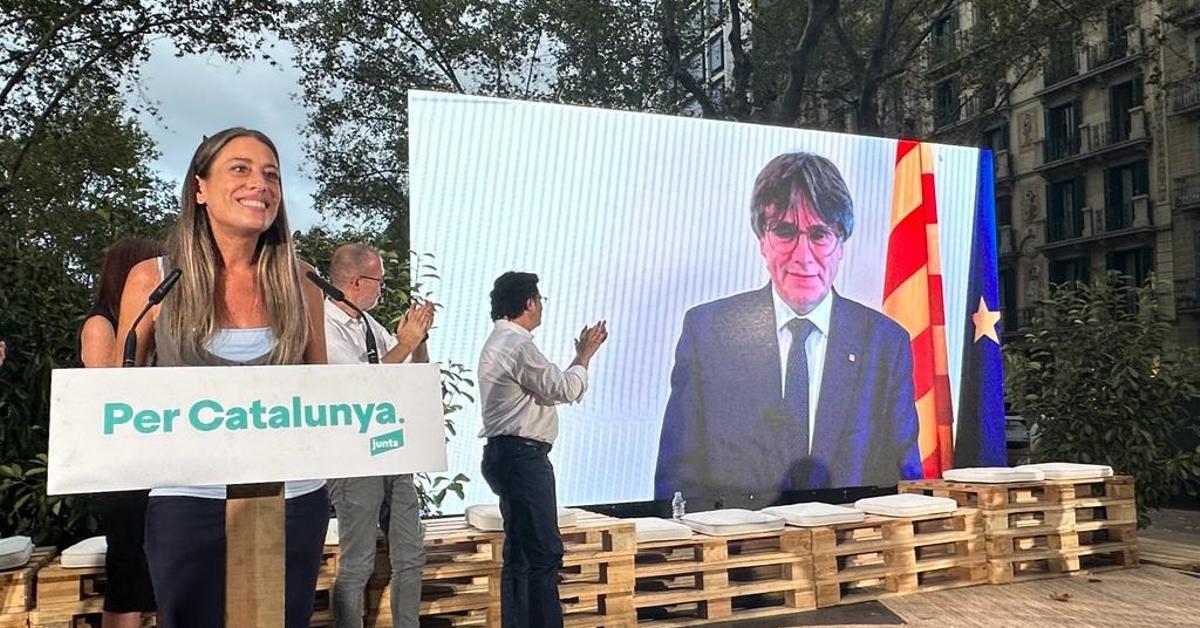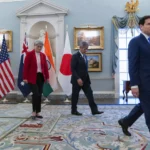
Junts’ thesis is that Pedro Sánchez needs the socialist candidate more than they do. That is the premise with which Carles Puigdemont’s party proposes a negotiation that all parties are clear will be complicated and whose outcome is not even outlined. Only an agreement can avoid electoral repetition and that is an argument that is used to try to get one and the other to agree to explore it, however remote it may be now.
The post-convergents explain that before the municipal ones, both the PSOE and the PSC conveyed the message to them that probably after the general ones they should approximate positions. At that time they were not even summoned and a “certain good relationship” was maintained with the Catalan socialists. But the alliances after 28M put an end to that desire for conciliation. Despite the fact that the PSC and Junts reached agreements in 32 municipalities, the agreements between the ERC and the Socialists in the Lleida and Tarragona councils fell fatally. Although what most outraged Junts was the agreement between the PSC and comuns with the help of the PP to unseat Xavier Trias from the Barcelona mayor’s office just a few hours before the investiture plenary session. “That play by the PSC disarmed the moderate wing of the party and left them without arguments,” they explain in Junts.
So the negotiation, when it begins, will have to put an end to the pending accounts after the municipal ones and focus on the entente options to avoid new elections (something that in Junts they do not rule out, but they do not take it for granted either). There is no hurry because they know that it will not be easy. The general secretary, Jordi Turull, travels this week to Brazil to participate in a cooperation project, but before that he has established a position. His starting point is an “agreed and binding referendum”, something that in these terms probably neither Sánchez nor any other PSOE general secretary can accept.
Turull wanted to insist that voting ‘no’ for Sánchez is not voting ‘yes’ for Feijóo. “We do not feel obliged to choose and we are not going to fall into the emotional trap of choosing between Sánchez and Feijóo,” he affirms to shake off the pressure of taking the blame for an electoral advance. “We will see what Pedro Sánchez is capable of doing, but not resolving the political conflict has consequences,” he warned. The slogan is the one that Junts has been repeating for a long time: “If the State has to be put in trouble, do it.” The question is where it places the limit.
Until now, whenever a difficult dilemma has been presented, Turull has positioned himself in favor of Puigdemont’s theses. The clearest example was the departure of the Government, probably the most important defeat suffered by the pragmatic sector of the party. The negotiations for the investiture of Sánchez will once again put the fragile internal seams of Junts to the test and it is impossible to know if it will end up fracturing it even more and causing the departure of some leaders.
Socialists and Sumar demand that they be “up to the task” while some sectors of the ERC present them with the dilemma of “Catalonia or Vox”. The Republicans, unlike Junts, warn that the blockade and, therefore, an electoral advance cannot be an option in any case. “You cannot run the risk of giving PP and Vox another chance after the ultra block has been stopped,” they argue. In that they are on a par with Bildu, which can reinforce them against the demands of Junts.
recover drive
At the moment, the pressure is not making a dent in Junts, something logical considering that negotiations have not even begun. The post-convergents consider that the bleeding of votes that Oriol Junqueras’s party chains is proof that his is a failed strategy. The Republicans lost 300,000 votes in the municipal elections and 411,000 have been left this Sunday. Puigdemont’s party has dropped by 137,000 and the CUP by 148,000. Taking into account that Sumar has also lost 53,000, it means that there are thousands of votes that have gone from the independence bloc to the socialist bag. In Junts they recognize that this is the case (“they have been very Spanishized elections”, summary) and they frame it in the dual vote that always reappears unequally in Catalonia when it comes to the general elections. They cite as an example that in Badalona the popular Xavier García Albiol won two months ago with an absolute majority and now the PSC has swept there, only surpassed by Junts in two census sections of the center and by Esquerra in another. In any case, there is another fact that has not gone unnoticed. The PSC has only obtained more votes than all the independence movement added up.
Junts insists that unity with ERC must be recovered (an appeal that the Republicans accept although they are suspicious that it could always be a poisoned envelope) and aspire to lead a front that includes the CUP despite having been left out of Congress and that goes beyond the parties and also takes into account Òmnium and the ANC (whose strategies are increasingly distant). They consider that “amnesty and self-determination” should be the axes that make it possible to formulate a common proposal.
At the moment the one who has moved token is Sumar. He has designated the former deputy Jaume Asens as his interlocutor with Junts. He was set aside as head of the commons list and chose to go home but now his services have been required again. He is a friend of Toni Comín and has never broken bridges with Waterloo. He was the one who called the lawyer Gonzalo Boye to design in October 2017 what they considered to be the best judicial strategy for Puigdemont (the report dubbed the “Domino Effect” that ended up being called “Domino 1”) and which has put magistrate Pablo Llarena in so much trouble.
Some time later, at a lunch with Miquel Iceta, when Asens explained to him how the judicial tactic involving the former president settling in Brussels was drawn up, the now minister and then leader of the PSC replied: And you didn’t explain how to get back?
That is one of the keys. Because Junts does not pose the negotiation in personal terms, but it is clear that Puigdemont’s judicial future flies over in any conversation that addresses the Catalan conflict. It is the most evident proof that not everything is solved, far from it. Because regardless of the internal turmoil that the negotiation can create both in Junts and in the PSOE, there is a third actor to consider as a potential destabilizer: Judge Llarena, who for six years has been seeking the extradition of the former president. For now without getting it. As of this Monday, the magistrate already has on the table a formal request from the Prosecutor’s Office to reactivate the international arrest and surrender order for Puigdemont, now only for the crime of embezzlement.
Waiting for Llarena
The Prosecutor’s Office has defined his writing as a “mandatory procedural action” after the European ruling that withdrew Puigdemont’s immunity (published on July 5). But it is difficult to see the fact that the four Supreme Court prosecutors – the same ones who, together with the Vox lawyers, failed in the thesis that the process was a crime of rebellion – made their request the day after the elections as a coincidence.
It should be remembered that among the four prosecutors who have returned to the charge with Puigdemont this Monday is a former State Attorney General with the Government of Mariano Rajoy, Consuelo Madrigal. Javier Zaragoza also signed the letter, who left the Progressive Union of Prosecutors a few months ago in a gesture that in judicial circles was interpreted as a signal to Alberto Núñez Feijóo to run to be the new State Attorney General in a PP government.
The four prosecutors remain installed in the toughest postulates about what happened in Catalonia despite the fact that the Supreme Court did not buy their thesis. Proof of this is that just a fortnight ago, the prosecutor Fidel Cadena asked to sentence the Mesa de Carme Forcadell to higher disqualification sentences by calling the sovereignist autumn of 2017 a “violent uprising”, despite the fact that the High Court did not sentence the pro-independence leaders for rebellion.
The ball is now in the hands of Judge Llarena, who can decide what speed to impose on the reactivation of the extradition process in Belgium (with its consequent impact on the political situation). The instructor can file a new Euro-order this Tuesday, but he could also process the State Attorney’s Office -which depends on the Ministry of Justice- and the defenses on the request of the Prosecutor’s Office, which would foreseeably leave his decision for the return of the summer.
In short, there are many numbers that the political talks for the investiture take place in parallel to the start of the process in Belgium on the extradition of the former president (which could take several months). One more example that the pardons alleviated but did not solve the Catalan crisis. The Puigdemont folder was and is still there.
–––––––––––
How to stop the lies
The 23J campaign has made clear the tremendous importance of the free press, which depends on its readers and owes nothing to anyone else. The vast majority of the big media are owned by banks, funds and large communication groups. The vast majority of them have whitewashed the ultras and are under the control of the agenda set by the right.
That is why we ask for your support. We need to grow. Hire more journalists. Reinforce our local editions against the lies of the local and regional governments of the extreme right. Sign more investigative reporters. We need to reach more people, build a bigger newspaper, capable of countering the brutal wave of conservative propaganda that we are going to face. And that will leave small what we have experienced in this dirty electoral campaign.
If you care about the future of this country, support us. Today we need you more than ever because our work is more necessary than ever. Become a member, become a member, of elDiario.es.
Source: www.eldiario.es

